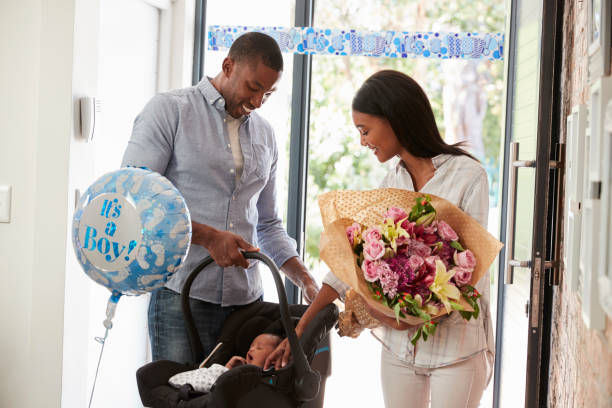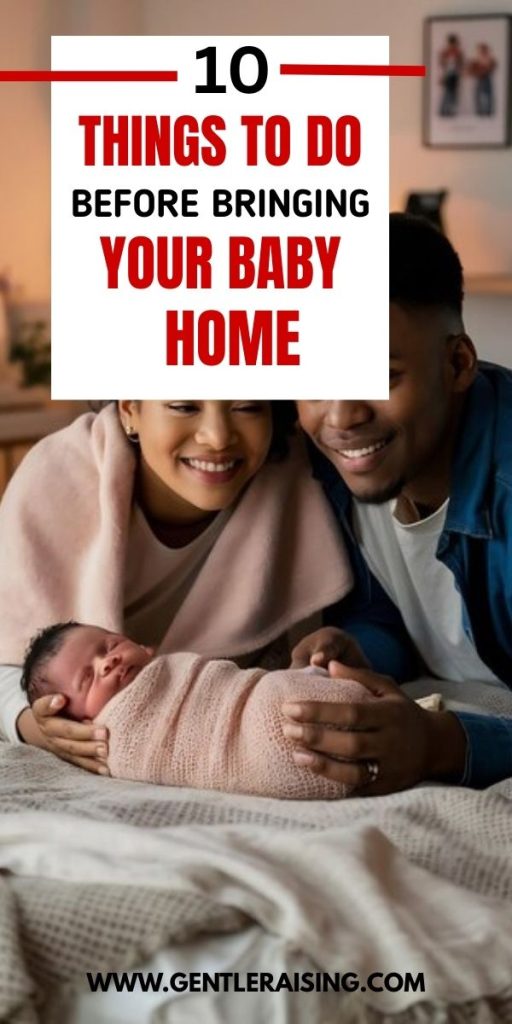That first drive home…
It’s a strange kind of quiet.
You’ve just been through days of the most surreal, exhausting, and beautiful chaos. Nurses checking vitals. Visitors arriving with flowers.
A steady stream of beeping monitors and hurried footsteps in the hall. And now, you’re buckling your baby into the car seat, double-checking the straps like you’re handling priceless cargo (because you are).
The car engine hums. The world outside hasn’t changed cars still zip past, coffee shops still open, the sky still does its thing but inside your car, life is completely different. You glance at the tiny bundle in the back seat and think: “Oh. It’s all on us now.”
That’s the moment most parents realize that while the hospital sends you home with a baby, they don’t exactly send you home with a manual. And even if they did, your baby wouldn’t have read it.
So here’s the thing these early days? They’re not about getting everything perfect. They’re about learning together, laughing through the messes, and figuring out that you already have more instincts than you think.
And to make that road a little smoother, here are 10 real things worth knowing before you walk through your front door with that tiny human.
1. The Home Doesn’t Have to Look Like Pinterest
Somewhere between the third trimester and the last week before delivery, the internet convinces a lot of parents that they need a nursery straight out of a magazine. Matching crib sheets, a rocking chair that costs as much as your first car, tiny baskets for tiny socks.
Here’s the truth your baby couldn’t care less about the color palette. They’re not judging your curtain choice. What matters most is that the space is safe, comfortable, and easy for you to navigate half-asleep at 2 a.m.
A few things that actually matter:
- A safe sleep space (crib, bassinet, or co-sleeper that meets safety standards).
- A nightlight in your room for those early feedings (your toes will thank you).
- Clear walking paths no tripping over laundry baskets while carrying a baby.
Your home will evolve. That fancy nursery? It might become a glorified storage room for the first few months because, spoiler: many babies end up sleeping in your room in the early days.
And if your place is small, don’t sweat it. Babies don’t need a wing of the house. They need you. And maybe a place to stash all those swaddles you’ll swear you didn’t buy that many of.
2. Stock Up But Not Like You’re Prepping for a Zombie Apocalypse
There’s something about expecting a baby that flips a switch suddenly you’re buying baby wipes in bulk like you’re single-handedly keeping the diaper industry afloat.
Yes, having the essentials on hand is smart. But overstocking on newborn-sized clothes? Rookie mistake. Babies grow like they’ve been secretly drinking protein shakes. Half those adorable outfits will be too small before you remember you own them.
What’s worth having plenty of:
- Diapers (newborn and one size up trust me, the jump to the next size happens fast)
- Baby wipes (unscented can be gentler on sensitive skin)
- Burp cloths (you’ll discover spit-up has superhero aim)
- Laundry detergent safe for babies
Stuff people forget:
- Nipple cream or formula prep tools depending on your feeding plan
- Stain remover (poop is ambitious)
- A few easy-prep freezer meals for you
And if you’re tempted to buy every gadget labeled “must-have for new parents”? Take a breath. The most important things in these first weeks are often the simplest arms to hold the baby, somewhere safe for them to sleep, and enough snacks for you to survive the witching hours.
3. Feeding Will Be Messier (and More Emotional) Than You Think
Feeding a newborn is a strange mix of science, instinct, and trial-and-error. Whether you’re breastfeeding, pumping, formula feeding, or a mix there’s a learning curve.
Nobody really prepares you for the emotional side. Breastfeeding can be beautiful and bonding and also painful, frustrating, and unpredictable. Formula feeding can feel straightforward and also come with its own costs and challenges. Either way, you’ll probably second-guess yourself at least once a day.
Here’s the thing: fed is best. Full stop.
Comfort hacks for feeding:
- Create a “feeding station” comfy chair, pillow, burp cloths, water bottle, and snacks.
- Keep phone chargers nearby (those late-night feeds can be long).
- If bottle feeding, prep what you can ahead of time to avoid 3 a.m. meltdowns yours or the baby’s.
Also, don’t be surprised if your feeding journey looks nothing like the one you pictured during pregnancy. That’s not failure. That’s parenting a series of adaptations, big and small.
4. Sleep for Everyone
Let’s rip the bandage off: newborns do not sleep like the babies in movies. You know the ones angelically snoozing in daylight while their parents cook dinner and smile over a glass of wine? Yeah… no.
Newborns sleep in short bursts usually two to four hours at a time. And they don’t care whether it’s day or night. That means your best bet is to nap when you can, and if you have a partner, consider taking shifts.
Some survival tips:
- Lower your expectations for housework.
- Keep the bassinet or crib close so you’re not stumbling across the room all night.
- Use white noise babies find it soothing, and it can help mask household sounds.
And here’s a weird truth: even when your baby is sleeping, you might find yourself lying awake just listening to them breathe. It’s normal. Your brain is adjusting to its new 24/7 job.
5. Prepare for Visitors and How to Politely Limit Them
The moment you have a baby, you become a magnet. Friends, relatives, neighbors, even your co-worker from two jobs ago everyone wants to “just pop by.”
The love is beautiful, but in those first weeks, you need rest more than you need to host. It’s perfectly fine to set boundaries. Send a group text with visiting hours, or have a partner or friend act as the “gatekeeper.”
Rules worth considering:
- No sick visitors (and yes, you can ask if they’ve washed their hands).
- Short visits 30 minutes is plenty in the early days.
- If they’re coming, they bring food or help with something.
The people who matter will understand. And the ones who don’t? Well, you’ll be too tired to care.
6. Your Baby Gear Will Multiply Overnight
When you first set up, it’s manageable a crib here, a stroller there. But somehow, within weeks, your home starts looking like a baby store exploded.
A swing in the living room. A pack ’n play in the corner. Blankets, swaddles, pacifiers, and teething toys scattered like breadcrumbs.
What helps:
- Choose gear that folds or stacks.
- Keep a small basket in each main room for quick clean-up.
- Rotate toys and baby gear instead of keeping it all out.
Remember: babies need less than marketers make you think. Love, milk, warmth, and your presence will carry them through far more than the latest gadget.
7. You’ll Google Things You Never Imagined
There’s a special search history that belongs only to new parents.
“Is it normal for baby poop to be green?”
“Why does my newborn make squeaky noises when breathing?”
“How to swaddle without baby escaping like Houdini?”
Most of these things are normal babies are noisy sleepers, poop comes in more colors than you’d expect, and yes, they have impressive escape skills.
To keep from spiraling:
- Have your pediatrician’s number handy.
- Bookmark reputable sources (American Academy of Pediatrics, NHS, Mayo Clinic).
- Avoid late-night deep dives into random parenting forums you’ll end up convinced your baby has a rare condition from 1873.
8. Your Relationship Will Shift (and That’s Normal)
Parenthood changes how you connect. Suddenly your conversations revolve around feeding schedules, who’s on diaper duty, and whether the baby’s gas is “normal.”
Intimacy changes too sometimes you’re so touched-out from holding a baby all day that even a hug feels like too much. And yet, there are moments of connection that are deeper than anything you’ve had before, laughing together over your baby’s first sneeze, or quietly watching them sleep.
Small things that help:
- Check in daily even five minutes over coffee.
- Appreciate each other’s wins, however small (“Thanks for handling that diaper blowout” is valid romance now).
- Remember you’re a team. Tired, messy, sometimes cranky but a team.
9. Postpartum Recovery Is a Journey for All Parents
For mothers, postpartum recovery is physical and emotional. Your body is healing, your hormones are shifting, and you may be adjusting to a body that feels entirely different.
For partners, there’s an emotional adjustment too learning to support, care, and sometimes feel a little helpless when you can’t fix the exhaustion your partner feels.
Know the signs:
- Baby blues (mood swings, weepiness) are common in the first two weeks.
- If sadness, anxiety, or overwhelm last longer or intensify, talk to a professional postpartum depression and anxiety are treatable.
Recovery isn’t linear. Some days you’ll feel capable and energized; others, you’ll feel like you’re moving through fog. Both are normal.
10. Trust Your Instincts
From the moment you announce a pregnancy, the advice starts pouring in from books, relatives, strangers in grocery store aisles. It’s well-meaning, but sometimes it’s conflicting, and it can make you question everything.
Here’s what no one says enough: you know your baby best. Yes, read, listen, learn but also tune in to your own gut. You’ll be amazed at how quickly you learn your baby’s different cries, their preferences, their rhythms.
You won’t get everything “right” nobody does. But you’ll get the important things right, because you care enough to keep showing up.
Final Thoughts: You’ve Got This
That first drive home feels like stepping into unknown territory. And in a way, it is. But it’s also the start of a new kind of normal one built around small moments, quiet wins, and love that grows in unexpected ways.
In a few years, you’ll look back on the midnight feedings, the endless diaper changes, the constant “Am I doing this right?” and realize that those messy, unpredictable days were the foundation of something incredible.
You don’t need a perfect house, perfect plan, or perfect parenting style. You just need to be present. And that, more than any list of tips is what makes a home ready for a baby.

